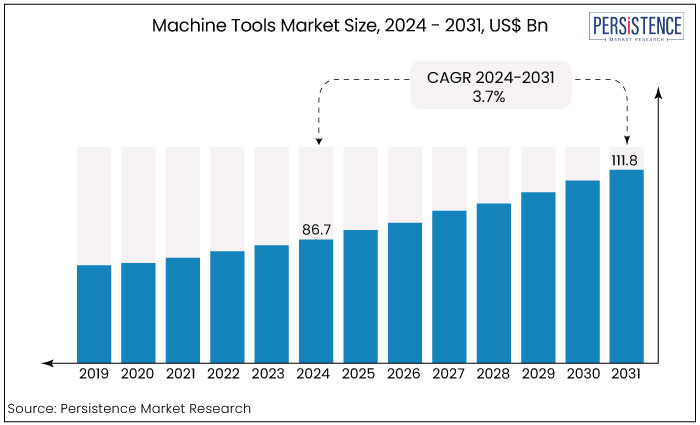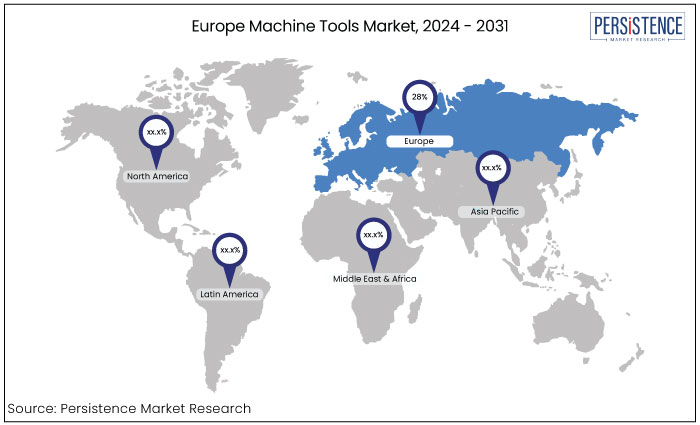PMR Projects a Steady Growth Outlook for Global Market Forecast Based on Growing Adoption in Automotive and Aerospace, and the Advent of Industry 4.0
Industry: Industrial Automation
Published Date: July-2024
Format: PPT*, PDF, EXCEL
Delivery Timelines: Contact Sales
Number of Pages: 184
Report ID: PMRREP30876
The market report for machine tools estimates the market valuation to reach US$111.8 Bn by the year 2031, at a CAGR of 3.7%, during the forecast period 2024 to 2031.

Key Highlights of the Market
|
Attributes |
Key Insights |
|
Market Value (2024E) |
US$86.7 Bn |
|
Market Size (2031F) |
US$111.8 Bn |
|
Forecast Growth Rate (CAGR 2024 to 2031) |
3.7% |
|
Historical Growth Rate (CAGR 2018 to 2023) |
3% |
The global machine tools market share represents a vital segment within the industrial machinery sector, encompassing a diverse range of equipment utilized in various manufacturing processes.
From cutting and shaping materials to precision drilling and grinding, these tools play a fundamental role in the production of components across industries such as automotive, aerospace, electronics, and construction.
The market thrives on innovation, driven by advancements in technology, automation, and the quest for enhanced efficiency and precision in manufacturing operations.
The market comprises manufacturers, distributors, and service providers involved in the production, sale, and maintenance of machinery and equipment utilized for shaping, cutting, drilling, and other machining processes.
Ranging from simple hand tools to sophisticated computer numerical control (CNC) machines, this market caters to a broad spectrum of industrial needs, facilitating the creation of intricate parts and components with high levels of accuracy and consistency.
With applications spanning diverse sectors, the market serves as a cornerstone of modern manufacturing infrastructure. Characterized by constant technological evolution and increasing automation, the market is witnessing several notable trends.
Key market trends include the integration of smart manufacturing concepts such as the Industrial Internet of Things and data analytics to optimize production processes and predictive maintenance.
Further, there's a growing emphasis on sustainability and energy efficiency, driving the adoption of eco-friendly machining solutions. As global demand for manufactured goods continues to rise, fueled by population growth and urbanization, the market is poised for further expansion, with a focus on precision, productivity, and sustainability shaping its trajectory.
The global machine tools market has experienced dynamic growth and transformation, influenced by technological advancements, economic trends, and evolving industry landscapes during the historical period 2019 to 2023.
The period from 2019 to 2023 has been marked by significant developments across various regions, driven by factors such as automation, digitalization, and shifting manufacturing demands, which has led the market to grow around a CAGR of 3%.
Further, the rising adoption of Industry 4.0, along with the smart manufacturing trend and using IoT devices, has gained the market the necessary traction in its growth trajectory.
Industry 4.0 Expansion
With the advent of Industry 4.0, the integration of machine tools with advanced digital technologies such as the Internet of Things (IoT), Artificial Intelligence (AI), and big data analytics has revolutionized manufacturing processes.
Tools equipped with smart sensors and connectivity capabilities enable real-time monitoring of equipment performance, predictive maintenance, and adaptive machining, leading to enhanced productivity, reduced downtime, and cost savings.
Moreover, AI-driven algorithms optimize machining parameters, improving precision and efficiency while minimizing material waste.
As manufacturers increasingly embrace the principles of smart manufacturing, the demand for technologically advanced machine tools continues to surge, driving market expansion.
Adoption in Automotive and Aerospace Industry
The automotive and aerospace industry are significant contributors towards market expansion. These sectors demand high-precision machining solutions to meet stringent quality standards and address the complexities of manufacturing intricate components.
Machine tools play a pivotal role in producing engine parts, transmission components, aircraft structures, and other critical components with exceptional accuracy and consistency.
Moreover, as automotive manufacturers transition towards electric vehicles and lightweight materials, there is a heightened need for advanced machining technologies capable of processing materials like composites, and aluminum alloys effectively.
Consequently, machine tool manufacturers are focusing on developing specialized solutions tailored to the unique requirements of these industries, further propelling market expansion.
Economic Volatility
The machine tools market faces a significant growth restraint in the form of economic volatility. Economic fluctuations, such as recessions or currency fluctuations, can significantly impact investment decisions within industries that heavily rely on machine tools, such as automotive, aerospace, and manufacturing.
During periods of economic downturn, companies may postpone or cancel capital expenditures, including investments in new tools or upgrades to existing equipment.
Further, uncertainty in demand can lead to reduced orders for machine tool manufacturers, resulting in production slowdowns, layoffs, and financial strain throughout the supply chain.
Moreover, the global nature of the market means that it is susceptible to geopolitical tensions and trade disputes, further exacerbating volatility.
To mitigate these challenges, companies in the machine tools sector must adopt flexible business strategies, diversify their customer base, and invest in innovation to stay competitive in turbulent market conditions.
Technological Disruption
Another significant growth restraint for the market is technological disruption. While technological advancements such as automation, robotics, and additive manufacturing present opportunities for increased efficiency, productivity, and customization, they also pose challenges for traditional machine tool manufacturers.
Disruptive technologies require new skill sets, investments in research and development, and reconfiguration of production processes.
Moreover, the transition from conventional to digital manufacturing necessitates significant capital expenditure and retraining of the workforce.
As a result, many traditional machine tool manufacturers may struggle to adapt to the rapidly changing technological landscape, risking obsolescence and market share loss to more agile competitors.
To remain relevant, companies in the machine tools market must embrace innovation, forge strategic partnerships with technology providers, and invest in workforce development to capitalize on the opportunities presented by technological disruption.
Customization and Personalization
There is a growing trend towards customization and personalization in manufacturing, driven by evolving consumer preferences and market dynamics.
Tools equipped with advanced software and adaptive technologies enable manufacturers to produce highly customized products efficiently and cost-effectively.
This trend not only caters to niche markets but also allows companies to respond swiftly to changing consumer demands, thereby gaining a competitive edge in the machine tools market.
Remote Monitoring and Maintenance
With the increasing adoption of IoT and connectivity solutions, remote monitoring and maintenance of machine tools have emerged as significant market trends.
Manufacturers are leveraging IoT-enabled sensors and data analytics to remotely monitor equipment performance, predict maintenance needs, and proactively address issues before they escalate.
This trend enhances operational efficiency, reduces downtime, and lowers maintenance costs, offering manufacturers a competitive advantage in an increasingly interconnected and digitalized manufacturing landscape.
Expansion in Developing Markets
The rapid industrialization and economic growth in emerging markets present lucrative opportunities for machine tool manufacturers.
By expanding their presence in these regions, companies can tap into burgeoning manufacturing sectors and cater to the growing demand for advanced machinery.
Strategic partnerships, localized production facilities, and tailored marketing strategies can facilitate market penetration and capitalize on the vast growth potential offered by emerging economies.
Diversification into Additive Manufacturing
The rise of additive manufacturing, or 3D printing, represents a significant opportunity for machine tool manufacturers to diversify their product offerings and capture new market segments.
By integrating additive manufacturing technologies into their portfolio, companies can address the growing demand for rapid prototyping, customized production, and complex geometries across various industries.
This expansion into additive manufacturing not only expands revenue streams but also positions manufacturers at the forefront of technological innovation, driving long-term competitiveness and market leadership.
Carbide Material Dominates with 28% Market Share
|
Market Segment by Material Type |
Market Value Share 2023 |
|
Carbide |
28% |
Based on the material type segmentation, the machine tools market is further divided into carbon steel, high-speed steel, and carbide, where the carbide emerges as a dominant segment.
Carbide offers exceptional hardness, wear resistance, and heat resistance, making it well-suited for various machining applications across industries.
Its versatility allows for efficient cutting, shaping, and forming of metals, plastics, and composites, catering to the diverse needs of manufacturers. Carbide tools are particularly favored in automotive, aerospace, and engineering sectors due to their ability to withstand high-speed machining and maintain precision.
Additionally, ceramic materials hold a significant share, especially in specialized applications where high-temperature resistance and chemical inertness are paramount, such as in aerospace and electrical industries.
While carbon steel and high-speed steel remain prevalent, their market shares are gradually eclipsed by the superior performance and durability offered by carbide and ceramic materials.
CNC Machines Spearheads, Accommodates 60% Revenue Share
|
Market Segment by Product Type |
Market Value Share 2023 |
|
CNC |
60% |
Based on machine type, the market is further sub-segmented into CNC and conventional machines, where the CNC machines dominates the overall market share.
CNC machines offer unparalleled precision, repeatability, and automation capabilities, driving efficiency and productivity in manufacturing processes. Metal-cutting CNC machines, in particular, are widely adopted across industries for their ability to fabricate complex geometries with high accuracy and speed.
Moreover, the shift towards CNC technology is evident in both metal cutting and metal forming segments, as manufacturers increasingly prioritize automation and digitalization to streamline production workflows.
While conventional machines still hold relevance in certain applications, the demand for CNC machines continues to grow, fueled by advancements in software, controls, and connectivity features, catering to the evolving needs of modern manufacturing.
Europe Marches Ahead with 28% Value Share
|
Region |
Market Value Share 2023 |
|
Europe |
28% |
Europe stands out as the dominant regional segment in the global machine tools market growth. Renowned for its strong industrial base, advanced manufacturing capabilities, and emphasis on technological innovation, Europe commands a significant share of the market.
Countries such as Germany, Italy, and Switzerland are recognized as key manufacturing hubs, renowned for their precision engineering and high-quality machine tool production.
The region benefits from a robust infrastructure, skilled workforce, and favorable regulatory environment, fostering innovation and competitiveness in the machine tools industry.
Moreover, Europe's strategic location facilitates trade and collaboration with neighbouring regions, further enhancing its prominence in the global market.
With a diverse customer base spanning automotive, aerospace, electronics, and other sectors, Europe remains at the forefront of technological advancements, driving demand for cutting-edge machine tools and solutions.
Asia Pacific Emerges Lucrative in Machine Tools Industry
The region's rapid industrialization, burgeoning manufacturing sector, and expanding automotive and aerospace industries propel market growth.
Countries like China, Japan, South Korea, and India are key contributors to the Asia Pacific market, witnessing substantial investments in infrastructure, technology, and workforce development.
Moreover, the adoption of Industry 4.0 technologies, coupled with government initiatives to promote manufacturing innovation and automation, further accelerates market expansion in the region.
The rising demand for consumer electronics, coupled with increasing investments in additive manufacturing and 3D printing, fuels the demand for advanced machine tools across the Asia Pacific.
With its vast market potential, evolving regulatory landscape, and growing emphasis on sustainable manufacturing practices, Asia Pacific presents lucrative opportunities for machine tool manufacturers and suppliers seeking to capitalize on the region's dynamic growth prospects.

February 2024 -
Nidec Machine Tool launched a new compact and powerful universal head, a light, thin, short and small product that is capable of catering to various machining needs.
August 2023 -
Okuma America Corporation, launched its next-gen machine control for CNC machine tools to improve user experience and high-speed operations.
March 2023 -
Yasda Precision Machining Tools signed a partnership deal with Methods Machine Tools as a precision machining centre across the United States.
The market is highly competitive, with several companies providing better commercial opportunities to their end consumers while utilizing new and high-end technologies into the machining and manufacturing sector.
With the evolution of robotics and other smart IoT devices into manufacturing sectors, the machining industry has been forced to update to new industry trends to cater to the evolving needs of the global consumers.
Major players in the industry are utilizing high-end machineries to pacify their production with smart and automated machining tools, which eventually erupts the competition in the global market.
|
Attributes |
Details |
|
Forecast Period |
2024 - 2031 |
|
Historical Data Available for |
2018 - 2023 |
|
Market Analysis |
US$ Billion for Value |
|
Key Regions Covered |
|
|
Key Companies Profiled |
|
|
Pricing |
Available upon request |
By Material Type
By Product Type
By End Use
By Region
To know more about delivery timeline for this report Contact Sales

The global machine tools market is estimated to exhibit a CAGR of 3.7% during the forecast period.
Europe is the leading region in the market.
The global machine tools market is segmented based on material type, product type, and end use.
Amada Co. Ltd., DMG Mori Aktiengesellschaft, Trumpf Group, MAG, and Makino are some of the major key companies in the market.
CNC machine is the dominant product type segment.